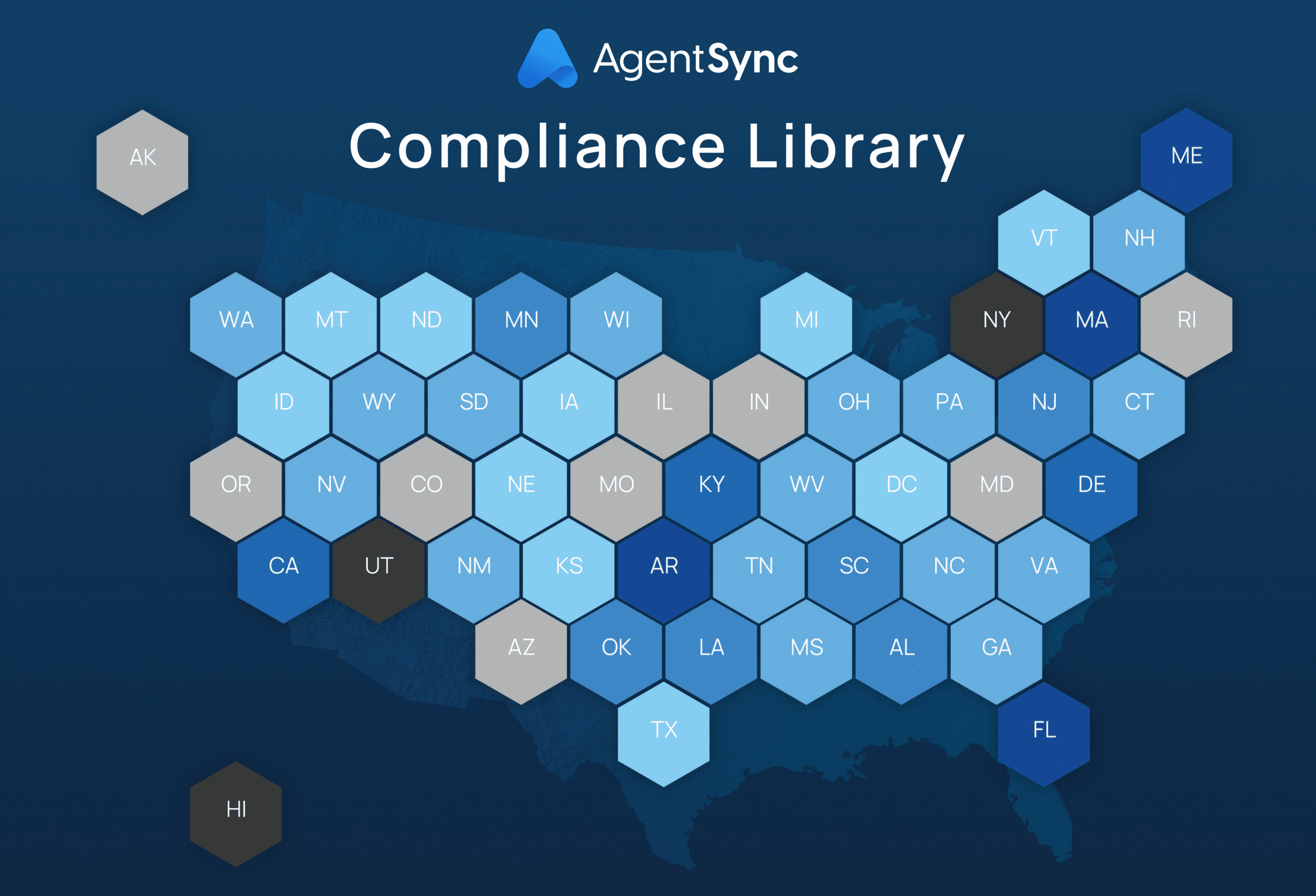

Not everyone’s lives or careers follow a straight-line pattern, and that’s just as true for insurance professionals as everyone else. When your personal history includes legal shenanigans, you may find yourself jumping through hoops across multiple states, filling out similar forms over and over, and struggling to make sense of the myriad rules that keep you from rediscovering your professional equilibrium.
In addition to disparate state rules, the Violent Crime Control and Law Enforcement Act of 1994 also introduced 18 U.S. Code Subsection 1033. This law requires anyone who’s been convicted of a felony crime involving “dishonesty” or a “breach of trust” to get special permission from their state insurance regulatory officials – called a 1033 waiver – to be able to work in the industry.
Each state has its own variation of how it incorporates – or doesn’t – the 1033 waiver process into its criminal history and self-reporting requirements. While we’ve covered 1033s broadly, and criminal history reporting at license renewal for each state specifically, this is a deeper dive into how a single state, Virginia, handles 1033s and criminal history. Thanks to Richard Tozer, Deputy Commissioner of Agent Regulation at the Virginia Bureau of Insurance for taking time to help us understand the state’s approach.
1033s and state regulations
The 1033 regulations are federal law, but the way they look in practice at the state level varies. While the NAIC issued guidelines on how to implement 1033 waivers, there’s not actually much consensus among the states regarding where these waivers fit into their state licensing and renewals process.
“When the law was enacted, it became obvious quickly that it was going to be open to interpretation,” said Tozer. The federal government’s rule gave very few strictures, and instead points to people who have past felony convictions that involved “dishonesty” or a “breach of trust” as the main concern of the law. But what is a felony involving dishonesty or a breach of trust, strictly speaking?
“One of our attorneys in the past said ‘Dishonesty to me is this: If I go in and rob your house, that’s an act of dishonesty. But if I tell you I’m going to rob your house and then I go rob your house, it’s not an act of dishonesty because I told you I was going to do it,’” Tozer related. The tongue-in-cheek anecdote makes the point – reaching a consensus on what the federal law means has eluded an already-disparate industry.
The NAIC state licensing handbook says, “When one state grants a written consent waiver to an individual pursuant to 18 U.S.C. §1033, the consensus of legal opinion is that this written consent waiver is effective nationwide.”
The handbook goes on to clarify that a producer is more or less beholden to their resident state’s 1033 process, whatever it is, and that nonresident state applications should respect the outcome of the producer’s resident state.
However, as Tozer said, “I don’t think all states are following the NAIC’s guidelines verbatim, to be honest.”
To Tozer’s point, some states never or rarely issue 1033s. Some states treat 1033s as any other felony conviction and essentially act as though the commissioner’s approval of a license application is the equivalent of a 1033 waiver. On the opposite end of the spectrum, states like Florida and Louisiana don’t issue 1033 waivers because they don’t admit any licensees to their market who have felony convictions involving dishonesty or breaches of trust.
Most states fall in between these extremes, issuing the occasional 1033 exemption, but typically only after a producer has applied for the waiver separately from the regular application process.
Virginia’s approach to 1033s and criminal history
Virginia takes a fairly novel approach to 1033s in that their producer applications are, in essence, also 1033 applications.
“Most states have a separate bifurcated process for the 1033 application,” said Tozer. “In Virginia, we don’t make applicants go through a separate process. We find that most applicants are not familiar with the 1033 waiver requirements or the Violent Crime Control and Law Enforcement Act of 1994.”
Instead of relying on producers to understand whether their past criminal history necessitates a 1033 waiver to do business in insurance, Virginia wraps the process into one.
The Virginia background review process
In the Commonwealth of Virginia, a would-be producer submits an application to the state, including background information and any documentation to support their history. This could include court documents, a letter of explanation regarding history, or documents showing civil rights restoration. They also must submit fingerprints, which the state processes through the FBI database. Prior to 2021, Tozer said, the state ran only a statewide background check, and producers would occasionally omit criminal histories in other states.
“But the state departments of insurance talk,” Tozer said. “We’d find out after the fact, and it could cause problems for the agent. Now that we fingerprint, we find out about these convictions right at the front end.”
For applicants who have felonies, including financial-related breaches of trust, in their past, their applications go to a committee for review. Tozer presents the applicants and the context of their past crimes to Commissioner Scott White. In addition to White and Tozer, the manager of agent licensing and an attorney from the Office of the General Counsel attend the committee meeting. The process of reviewing the applicants is highly individualized, with the committee discussing numerous factors besides the criminal history.
“Some felonies are more serious than others. We consider what you were originally charged with and what you were ultimately convicted of. Often we find individuals convicted of felony crimes who may not have the legal representation or the wherewithal to go to court to plead their case. If they had the appropriate legal representation, the felony charges may have been reduced to misdemeanors,” said Tozer. “It all depends on your access to the justice system.”
The review process may even include a call to the applicant to ask further questions about their sincerity and the specifics of their background. From there, the Commissioner will decide whether someone should be admitted as a Virginia insurance licensee. If the applicant has a history that includes felony crimes the Commissioner deems may be a 1033 offense, the Commissioner issues the 1033 waiver at the time they approve the application, no extra steps necessary.
“It’s all one streamlined process,” said Tozer. “Because even if applicants [know about the 1033 rule], they don’t understand the meaning of it. The Act is written to be very broad, and the definition of dishonesty or a breach of trust is open to interpretation.”
NAIC guidelines provide some assistance, but states are free to make their own waiver programs.
Two classes of 1033s
“Virginia tends to take everyone on a case-by-case basis, we don’t have any permanent bars or instant nos, we rarely deny, we tend to take a new-light, second-chance view,” said Tozer.
When an applicant has passed their required exams and given the Virginia regulators reason to believe that their past is truly past, they may receive their 1033 waiver. In most cases, this is a “blanket” 1033, allowing them to freely work in any area of the insurance industry. That said, some applicants are decidedly on the fence.
“Sometimes we issue a restricted 1033 to people with particular financial crimes, where we limit the licensee to an insurance agency, or restrict licensees from handling money,” said Tozer.
It’s also important to remember that 1033s affect a vanishingly small proportion of applicants – Tozer estimated that of nearly 98,000 insurance applications in a year, the state may issue a handful of 1033s.
Upcoming changes to NAIC’s 1033 guidelines
Tozer is a member of the NAIC’s Producer Licensing Task Force (D) Committee, where he’s entrenched with fellow regulators across the U.S. in revising guidelines for how states handle the 1033 waiver process.
The committee is reviewing the guidelines for general flexibility in the hopes they can get wider adoption among states for greater uniformity and reciprocity. Among the upcoming changes, he suggests keeping an eye out for three areas of focus: definitions, forms, and factors.
1. Definitions
Currently, the definition of a felony conviction in 1033 guidance does not include pleas in abeyance – when a person pleads “guilty” or “no contest” to charges, but the court suspends sentencing. Yet, the definition does include expungements.
The downstream effect of these definitions is that someone who pleaded guilty to a financial crime but who otherwise didn’t walk away with other significant penalties can excusably not report the incident on their insurance license application. Yet, someone who was convicted of a crime, served time, engaged with the process, and ultimately the state sealed and closed the records would still need to report that crime in every application, even 30 years later.
New definitions may see those situations reversed, with applicants needing to include pleas in abeyance while being able to drop their documentation for expungements.
2. Forms
When the 1033 process was first launched, the NAIC advocated that states use two forms, a short form for existing producers to fill out and bring their documentation current, and a longer form for new agents to fill out should they need a 1033 waiver.
As Tozer notes, many states have continued to use the short form decades after guidelines suggested they should’ve switched to the longer form. As for Virginia, they use neither.
“The long form requires a passport photograph, and has much the same information as the NAIC Uniform License Application,” said Tozer. “In our opinion, we don’t need that separate form process.”
3. Factors
The NAIC committee is putting together new guidelines that include a wider range of factors for a state department of insurance to consider beyond the initial felony conviction.
Tozer argues it matters whether the record has been expunged, or you were pardoned, or you were able to have your civil rights restored, or your pastor issues a letter of support, or it’s been decades since your conviction…
“If you’ve got a consistent track record of breaking the law, then that’s one thing, versus if you broke the law 25 years ago and have lived a law-abiding life since,” said Tozer. “We look at the applicants’ circumstances beyond the crime.”
Virginia’s position on the Producer Licensing Task Force (D) Committee is a testament to their middle-ground, streamlined approach to criminal histories and 1033s, but will other states adopt a broad, flexible Virginia-like process in the future?
“Who can say? We’ll wait for the lawyers to get involved,” Tozer said.
Changing landscape of criminal history
National sentiment regarding people’s criminal pasts has shifted over the last few decades. More states are incorporating criminal histories into that list of personal data subject to protection, including Virginia, which passed numerous changes to state license processes in 2021 that could affect the way several departments in the state tackle background reporting.
For the Bureau of Insurance, this means in a few years, once the rules are fully implemented, insurance regulators won’t be able to ask about applicants’ expunged records.
“This also applies to securities, banking, and other licensing agencies,” said Tozer. “It’s something that makes it difficult in using the Uniform Application from the NAIC.”
Several states are enacting their own versions of these initiatives to put the past in the past for people with distant criminal histories. Michigan, as we have written about, has a clean slate law that’ll automatically expunge certain felony convictions. So what does all of this look like for states with disparate criminal history regulations moving forward?
“It’s going to be tricky,” Tozer said. “It’s going to be a difficult landscape for all the states to navigate, broadly speaking. But hopefully, at some point, we’ll get to the point where the 1033 waiver process is more consistent and uniform among the states.”

